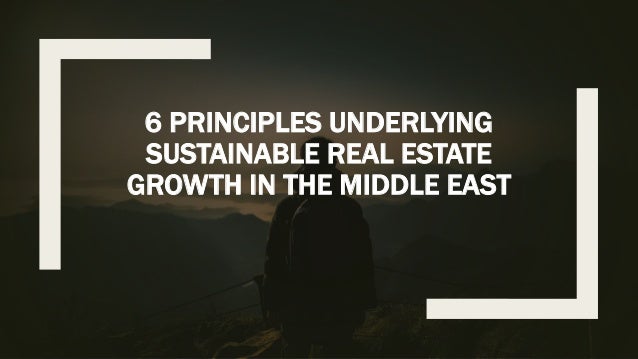6 Principles Underlying Sustainable Real Estate Growth in the Middle East.pptx
- 1. 6 PRINCIPLES UNDERLYING SUSTAINABLE REAL ESTATE GROWTH IN THE MIDDLE EAST
- 2. â– A number of real estate markets across the Middle East are poised to experience significant growth in the coming years. Amid this potential for growth, there has been a growing conversation about how to engage in real estate development in a sustainable way. Governments across the region have engaged in significant economic measures and incentive packages to drive growth in this sector. However, there is no clear pathway for how to sustain this growth for the long run. Importantly, a robust real estate market can drive larger economic development, which is why governments have made this a central focus. Recently, PwC Middle East looked at the top-ranking markets in the region and conducted an analysis to identify best practices for the region.
- 3. â– Much of the focus of this analysis has to do with closing regulatory gaps between markets in the Middle East and those in other parts of the world. Doing this will increase the confidence of nationals to purchase real estate in their own countries while also encouraging more investment from foreigners. Ultimately, PwC identified six key principles that can be used to reduce market volatility and help correct prices following the economic effects of the pandemic. The principles were chosen to create a positive balance in terms of competition, reduce asymmetric information, and improve market distortions, all of which discourage people from buying into markets. While the principles apply across the region, each country will need to focus on specific elements more than others. The identified PwC principles include:
- 4. Create property registrations â– A property registration serves as a central database for information to help reduce fraudulent transactions. This registration needs an effective and efficient system for cataloging and classifying property. Such a system can eliminate a lot of the guesswork that occurs when it comes to property sales. Registrations largely speed the process of real estate transactions and help minimize the costs involved with buying or selling. Reduced costs remove some of the hurdles that can exist when it comes to purchasing real estate. Property registrations are also important in attracting foreign investment to a particular market since they help instill confidence that the transaction is a valid one.
- 5. Integrate legal frameworks â– Real estate sectors should have an integrated legal system that aligns with both local and international norms. Such a system protects the legal right to ownership and serves as a fundamental building block for the entire sector. Plus, a solid legal foundation reduces the time necessary for resolving disputes and can help protect certain populations within the market. Knowing this, people may become more likely to participate in the market as a result. The stress of disputes has historically kept many people from pursuing property ownership in the Middle East.
- 6. Improve service proficiency â– Improving service proficiency largely means investing in technology to support the real estate market. Alongside this, governments should think about how they train their employees in technical skills. Technology can facilitate the development of many other principles on this list, but governments need to ensure they have skilled staff to build and maintain the technology, not to mention to help the general public use it. Today, many people do not trust paper transactions and for good reason. Technological solutions help build trust among people interested in completing purchases, especially when it comes to registering the property and verifying ownership.
- 7. Ensure effective governance â– If governments do not already have a structure for managing real estate within the country, they need one. A centralized body for overseeing regulatory and monitoring activities is key for boosting trust. Also, this sort of body can establish audit and enforcement policies to ensure continued effective governance. Plus, these bodies are essential in developing a communication framework between the various players in real estate. Improving this sort of framework can help lead to better policy creation and implementation by allowing all players to have their voices heard.
- 8. Provide sustainable finance options â– The finance and credit policies of nations across the globe all look very different. This is because countries tend to fine-tune these options according to the concerns and expectations of local consumers, as well as investors. In the Middle East, this means that the mortgage market is often not very large. However, the lack of financing options keeps many people removed from the real estate market. Access to financing can significantly boost the dynamics of a real estate market by expanding the number of people who can participate. Mortgage markets need to be robust, as this is the way to keep rates competitive and affordable, which in turn helps get the private sector more involved with real estate.
- 9. Manage data transparently and securely â– People who purchase real estate need access to a secure database of property. When information is available in a transparent manner, people can verify data and reduce the risk of falling victim to fraud. Ideally, people can access this database easily and understand how the data is kept safe from third-party alteration. Transparency has emerged as one of the key barriers to investment in real estate in the Middle East. Markets that are more transparent readily attract investors because that helps keep the investment safe. Moreover, transparency encourages fairness and competitiveness within the market.









